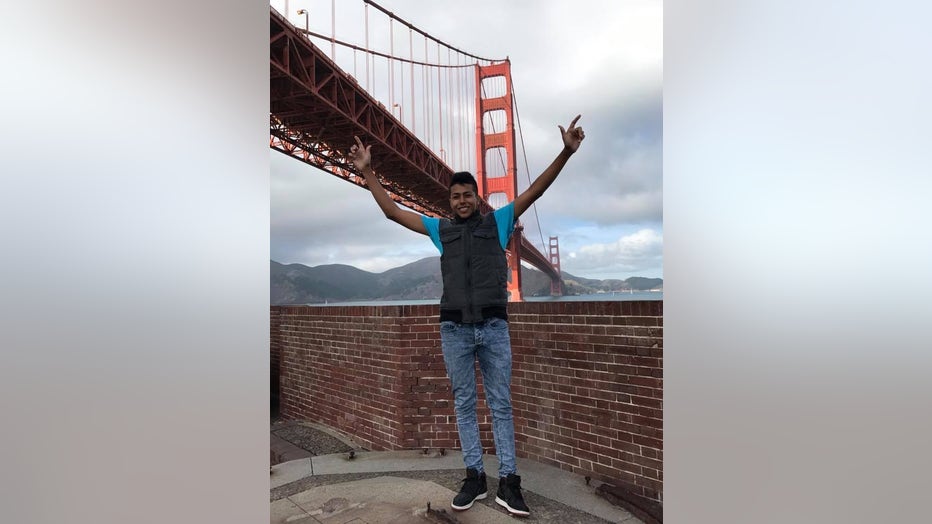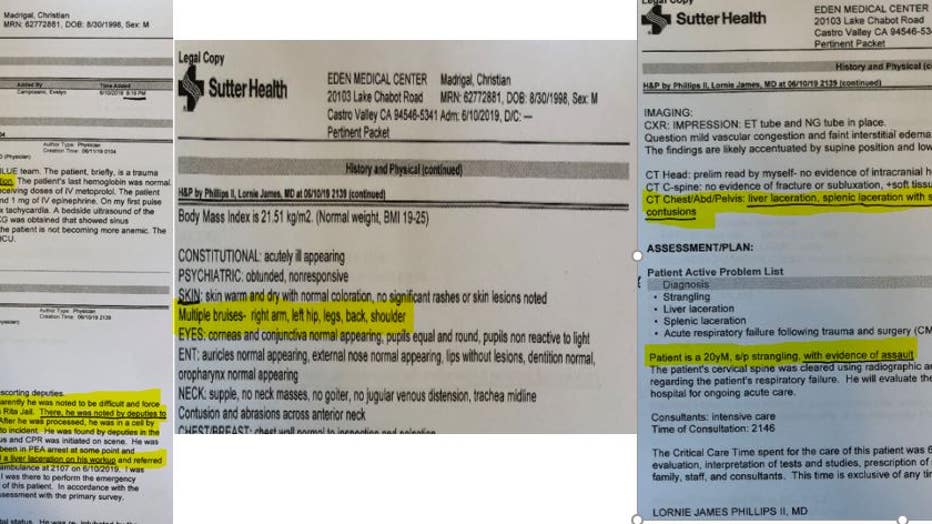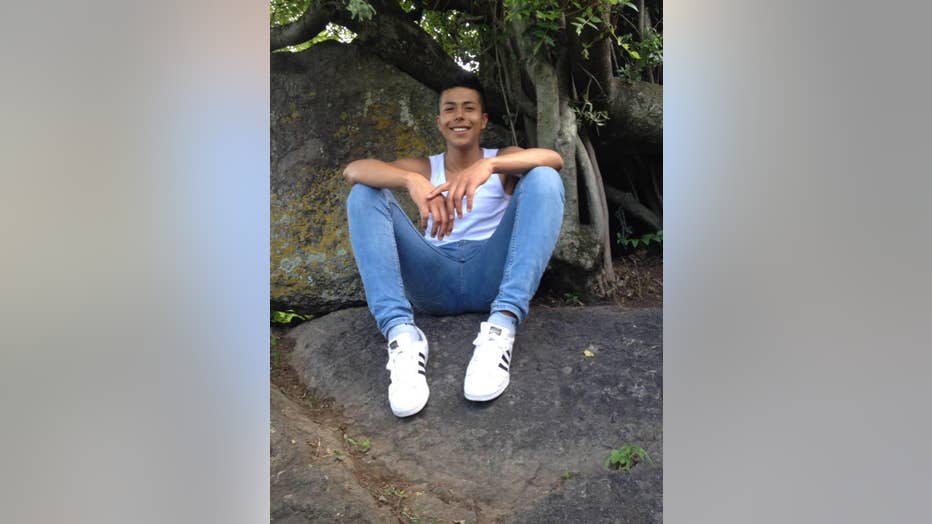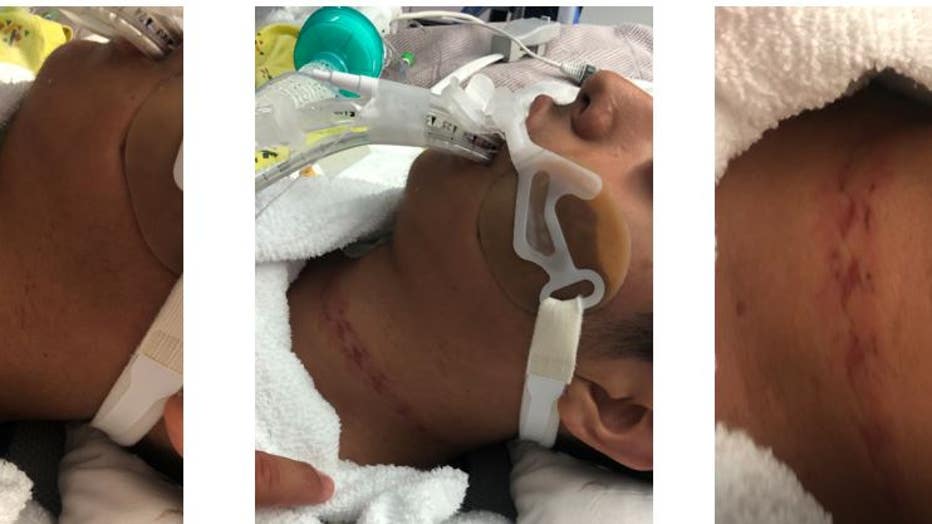Fremont father will forever feel guilty for calling police to help his son
Jose Jaime of Fremont sits behind a computer with pictures of his dead stepson. "We called the police for help. I can’t tell you how guilty we feel now.”
FREMONT, Calif. - Jose Jaime always loved police. The Fremont father often rushed to the front of the line to pay for an officer’s coffee. Once, he said, he saw a cop at a taco stand in Santa Clara, so he hopped out of his car to buy her a burrito. He collected officers’ business cards. He followed police departments on Twitter.
“I have always appreciated what police do,” the 39-year-old planning manager for a production company said recently. “And I have tried to transmit that to the boys. Never the bad. I want them to think positively.”
Then Jaime took a long pause. “But this has changed my mindset,” he said.
This is what happened to his stepson, Christian Madrigal, who died on June 15 after being arrested by police and a five-hour stay at Santa Rita jail. Though the official cause of death has not yet been released, according to a claim filed by the law firm of civil rights attorney John Burris, Madrigal committed suicide after he was chained to an isolation cell door. But at the hospital, doctors found that Madrigal had also suffered a lacerated spleen and liver, along with external bruising all over his body, according to medical reports provided by the family. Where and how he got those bruises is still a mystery.
Jaime said his love for police is forever gone. He is now consumed with the pain of losing his stepson. Every day, these feelings seem to get worse.
“Since all this happened, I can never finish telling you how we feel about losing him,” Jaime said while sitting next to his wife, Gaby, of 16 years. “I thought we were doing the right thing by calling police. I thought, ‘Everything will be OK.’ I told my two other boys, ‘Nothing bad will happen.’ We called the police for help. I can’t tell you how guilty we feel now.”

Christian Madrigal, 20, treated his body like a temple, played soccer regularly and kept a strict vegetarian diet, according to his family. He was especially close with his mother. His stepfather said he had never been in trouble with the law.
Madrigal’s story is a cascade of tragedies that befell one Fremont family: a son who may have had a psychotic break after experimenting with mushrooms, calls to police that went horribly wrong, and nagging questions about how and where the 20-year-old sustained internal injuries.
“At every step of the way, Christian was met with punitive measures, not ones that would have helped him,” said the family’s attorney, Adante Pointer, one of the lead litigators for the John Burris law firm, which handles high-profile police use-of-force cases. “His parents just want answers. And it seems as if many agencies are covering things up.”
Madrigal’s case also raises serious questions about whether the Alameda County Sheriff’s Office is undercounting the number of people who die in its custody. The sheriff’s office claims Madrigal’s death should not count as one of the 42 in-custody deaths since 2014 at Santa Rita Jail, even though deputies told doctors the young man “hanged himself” at the jail, medical reports show.
As previously reported by 2 Investigates, Santa Rita has the highest number of inmate deaths per capita among Bay Area jails, and its death rate is even higher than that of Los Angeles, the largest jail system in the United States.
In a series of emails, the Alameda County sheriff’s officials argued that Madrigal’s case should not be counted as an in-custody death because he was let go on “compassionate release,” a policy that allows inmates to be released from custody, usually if they are dying and elderly. The sheriff’s office also said two other deaths this year – including that of Christopher Thomas – should not count as in-custody deaths because they were also released under “compassionate release.” In Thomas’ case, the autopsy report provided by family shows he committed suicide in his cell. The autopsy of the third inmate has not been released.
2 Investigates requested from the sheriff’s all related information about what “compassionate release” entails and what criteria must be met. But the office said it had no such records. All Alameda County Sheriff's Sgt. Ray Kelly would say is that a "captain or commander" makes the decision with "input from medical professionals and staff" before such a release is granted. In Contra Costa and Santa Clara County, compassionate releases must be approved by the District Attorney and cleared by a judge. Jail officials there said those releases are very rare.
Madrigal’s family has not yet seen the official autopsy report on how the young man died. No one officially told them that Madrigal was released under compassionate terms. They learned of it through a prior 2 Investigates report.
“It’s just shocking,” Jaime said. “There was no compassion here."

Deputies told doctors Christian Madrigal strangled himself with sheets and "no use of force was necessary at their facility." Courtesy: Eden Medical Center/John Burris law firm
Kelly wouldn’t answer any specific questions about Madrigal's case.
“This is a very active and ongoing investigation by the DA and our office,” Kelly wrote in an email. “All of those questions will be answered and made available to the public and media when the investigation is complete.”
However, he did say that Lt. Craig Cedregren is on administrative leave as investigators look into whether he allegedly chained Madrigal to his cell door, a violation of jail policy, which the East Bay Express first reported.
Teresa Drenick, a spokeswoman for the Alameda County District Attorney’s Office, said prosecutors have not yet finished looking into the matter. “As per our regular protocol, we have an active Critical Incident Investigation in this matter,” she wrote in an email.
The story of how Madrigal died starts long before he found himself in Santa Rita.
He and his family spent most of their lives in Mexico. He never got into trouble, treated his body like a temple, played soccer regularly and kept a strict vegetarian diet, according to his family. He was especially close with his mother. His stepfather said he had never been in trouble with the law in either country.
In 2016, Jaime, who was born in the United States and is a U.S. citizen, and his family moved to Fremont. Madrigal wasn’t too pleased. Neither were his two brothers, now 18 and 17. Their lives were back in Guadalajara, where their friends and girlfriends reside. Madrigal, who was in the U.S. legally on a green card, didn’t speak much English, and because he was already out of high school, didn’t have the chance to make many friends. Madrigal ended up working at a local burger joint.
On May 25, Madrigal ate psychedelic mushrooms for the first time, his stepfather said. According to one of his brothers, he only took one. He had smoked marijuana before, but was not a regular drug user.
But after trying the hallucinogens, Madrigal was never the same.
“He started eating hamburgers and candy,” Jaime said, noting how strange this was for a young man who prided himself on healthy eating. “He used to eat only fish and broccoli and drank bottled water. Then, he started drinking straight from the sink and Coca Cola.”
His brother, who did not suffer any ill effects, noticed a change in Madrigal right away. Other things changed, too.
“He seemed violent,” Jaime said. “You could just see the demeanor in his eyes.”
Jaime doesn’t know for sure, but he believes the mushrooms caused Madrigal to have some sort of psychotic break. “We knew what we were seeing was not our Christian,” Jaime said.
Jaime insisted that as far as he knows, Madrigal did not take any drugs after that, even though his behavior continued to be erratic. There is no toxicology report to prove either way whether he did or not. Psychoactive effects of mushrooms usually leave the body in one day. But the only explanation the family has is that after Madrigal took the mushrooms, something inside his brain was not right anymore.
On May 31, Jaime called 911 because his stepson was outside the apartment complex with a knife, according to a Fremont police report obtained by 2 Investigates. Police came, but took no action.
Madrigal kept pestering his parents to go back to Mexico to visit his grandmother. Finally, they agreed, hoping the trip would help ease his aggression.
“We were really concerned,” Jaime said. “But he was demanding it.”

Christian Madrigal tried mushrooms on May 25, 2019 and his family said he was never the same.
So, his mom bought him a plane ticket and on June 6, took her son to Norm Y. Mineta San Jose International Airport. Madrigal seemed paranoid, accusing his mother of not taking him to the right place. When he got there, he pushed past the TSA check-in without a ticket. In the Fremont police report, officers wrote that Madrigal “charged through airport security” and fought five officers. In the San Jose police synopsis of the report, officers wrote that he “violently resisted” arrest and at one point “had his hand on the officer’s gun.”
San Jose police shocked him with a Taser four times and took him jail, where he was booked on charges of resisting arrest, attempting to remove a firearm from a peace officer, trespassing and being under the influence of a controlled substance.
Jaime said there was no evidence, other than his wife telling police about the mushrooms ingested 12 days earlier, that his stepson had taken any more drugs that day.
"We were trying to be honest with police and tell what what was going on," Jaime said.
Police then took Madrigal to Valley Medical Center in San Jose. No one there noticed that he was suffering a mental health crisis after the mushrooms, Jaime said. Or if they did, they sent him home anyway. The reports from the hospital have not been made public to the family.
“I told them that something was going on with Christian,” Jaime said. “And they said, ‘If he acts up again, call 911.’”
Jaime said a nurse told him that since his stepson was 20, he couldn’t force him to go see a doctor: But if Jaime called police and asked for a “5150,” or an involuntary psychiatric hold, then police would just drive Madrigal to the hospital.
“There won’t be any charges,” Jaime recalled. “It’s the safest way to treat this. That was the recommendation I got from the nurse.”
Madrigal continued to act oddly, his family said. Two days after the airport arrest, on June 9, Jaime again called Fremont police. The next morning, Jaime’s younger brother called 911 again. Madrigal couldn’t answer basic questions and he seemed disoriented.
When police arrived on both occasions, Jaime begged police to take his stepson in on a 5150 hold.
“I told them I would pay any price, pay any transportation costs,” Jaime said. “I didn’t want him to go to jail. I wanted him to be taken to a psychiatric unit.”
At first, Fremont police didn’t think Madrigal met the criteria. In the police report, officers noted that he was “non-aggressive and compliant.”
But then, the tone changed.
Madrigal pushed an officer out of the way to walk upstairs, the police report states. Officers decided at that point to arrest him for being under the influence -- based on his parents telling officers about the prior mushroom experience -- and take him to jail in Fremont to “sleep it off.” In jail, Madrigal refused to place his hands outside his cell bars to be cuffed and he refused a blood draw. Before that, he “actively resisted” taking a booking photo, the report states, and walked out of his cell into officers, reopening a scab on an officer’s knee, the report states. Fremont officers then decided to put Madrigal in a physical restraint called a WRAP, according to the Burris claim, and conducted a “cell extraction,” the police report states.

Photos from the hospital show what look like to be chain marks around Christian Madrigal’s neck. Courtesy: Eden Medical Center/John Burris law firm
It was at this point that Fremont police decided Madrigal was causing too much trouble, so they transported him to Santa Rita Jail in Dublin. Not much is known about what happened at Santa Rita because no records and no video have been released. Jaime said his stepson was there for about five hours.
According to the Burris firm’s claim, jail deputies ignored Madrigal’s parents’ pleas to have him examined by a mental health professional or transferred to a mental health facility.
“He is not OK,” Jaime recounted what he said to the deputies when he arrived that afternoon to try to see his stepson. “I am here to help my boy.”
But he was refused a visit, and eventually Jaime went home.
Six hours later, Jaime got a call. “There was an accident at the jail,” they told him.
But Jaime doesn’t believe what happened to his stepson was an accident at all.
According to Burris’ claim, Cedgregen ordered his deputies to chain Madrigal to an isolation cell door, in violation of the jail’s internal policies. The deputies initially protested the lieutenant’s commands but ultimately relented to their superior officer’s authority, the claim states.
Madrigal was left unattended for at least 10 minutes and was found trying to commit suicide, according to the medical notes. The hospital report, taken from paramedics, physicians and escorting deputies, states Madrigal was "in the process of strangling himself with sheets" at Santa Rita. But photos from the hospital show what look like to be chain marks around Madrigal’s neck. The family can’t figure out this discrepancy.
At Eden Medical Center, doctors found Madrigal was suffering from a lacerated spleen and liver, along with bruising all over his body, including pulmonary contusions. The doctors noted in the report that there were signs of an “assault.” The medical notes did not state who caused them or where they were sustained. Hospital notes also indicate deputies told doctors that Madrigal was "difficult, but no use of force was necessary at their facility."
Madrigal never recovered. He was pronounced dead at the hospital.
Since then, Jaime has been meticulously documenting the case, gathering notes and documents and providing a timeline of events for his attorneys. He has filed claims against Fremont police and the sheriff and he is working to get body camera video released from the jail to see what happened there. He is poised to file a civil rights lawsuit in the near future. At the same time, he's doing everything he can to comfort his grieving wife and shield his younger boys from the specific, tragic details. And, of course, he continues to second guess himself about calling police for help.
Perhaps what sticks out in his mind the most is what a nurse said to him as he left the hospital after learning his stepson was dead. Whispering, she urged him to contact the Burris law firm to find out who was responsible and how exactly Madrigal had died.
“What they did to your son wasn’t right,” he recalled she told him. “It was horrible.”
KTVU's Simone Aponte contributed to this report.
UPDATE: After this story was published, Sgt. Ray Kelly contacted KTVU stating emphatically that Madrigal did not use bedsheets to commit suicide. "I can confirm for you 100% that no bed sheet was involved," he said. Madrigal had been in the booking area, where there are no sheets, Kelly said. "A deputy doing a transport to the hospital may not have known all the details." Kelly said those deputies were probably not involved: "Somehow inaccurate info got relayed but that can happen. That's why we do thorough investigations."

